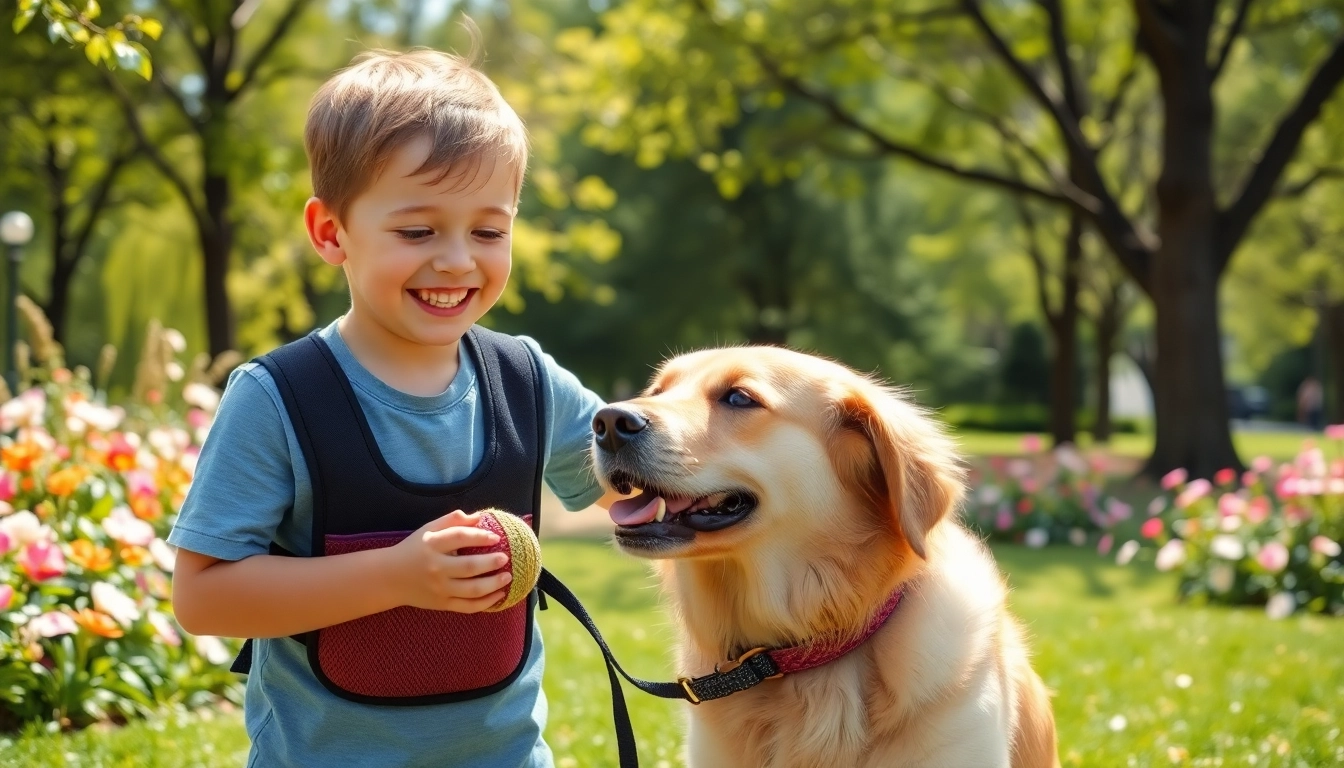Understanding Autism Service Dogs for Sale
What are Autism Service Dogs?
Autism service dogs are specially trained animals designed to assist individuals, particularly children, on the autism spectrum. These dogs undergo rigorous training to perform tasks that help their owners navigate daily challenges associated with autism. From providing companionship and emotional support to executing specific tasks aimed at promoting safety and independence, these dogs play a vital role in the lives of families affected by autism. Understanding the unique qualities and training requirements of these service dogs is crucial for families considering autism service dogs for sale.
How Do They Assist Children with Autism?
Autism service dogs assist children with autism in several profound ways:
- Emotional Regulation: Many children with autism struggle with emotional regulation. A service dog can provide comfort during stressful situations, acting as a calming presence.
- Safety and Security: These dogs can help prevent wandering, a common behavior among children with autism. They can be trained to alert caregivers if a child is in distress or wandering away from a safe area.
- Social Skills Development: The presence of a service dog can help facilitate social interactions, providing opportunities for children to engage with peers and build friendships.
- Daily Task Assistance: Service dogs can be trained to fetch items, provide reminders, or even help with transitions between activities, making daily routines more manageable.
Legal Rights and Regulations Regarding Service Dogs
In the United States, laws such as the Americans with Disabilities Act (ADA) govern the rights of individuals with service dogs. These regulations clarify where service dogs are allowed to go and outline the qualifications needed for a dog to be considered a service animal. Importantly, a service dog must be individually trained to perform tasks directly related to the person’s disability. As such, it’s crucial for families to understand both their rights and responsibilities when obtaining a service dog for autism.
Benefits of Autism Service Dogs for Sale
Emotional Support and Stability
One of the most profound benefits of autism service dogs is their ability to provide emotional support. For children on the autism spectrum, the presence of a devoted dog can serve as a source of unconditional love and stability. The bond between a child and their service dog can help reduce anxiety and improve overall emotional wellness. Furthermore, these dogs are often trained to sense their owner’s emotions, allowing them to react accordingly, which can lead to significant improvements in behavioral responses in stressful situations.
Improved Safety and Independence
Safety is a major concern for families with children who have autism. Autism service dogs can enhance safety by preventing wandering. With proper training, these dogs can be taught to stay close to their child in public spaces. Some are equipped with tracking devices, ensuring a child’s location can be monitored. This additional layer of safety promotes greater independence for the child while offering peace of mind to caregivers.
Social Interaction and Community Integration
Service dogs facilitate social interactions, which is particularly beneficial for children with autism who may find social settings challenging. The presence of a dog often draws attention, helping children engage with others more easily. This can lead to improved social skills and greater integration within the community, as the child learns to initiate conversations or participate in group activities involving their service dog.
Finding Quality Autism Service Dogs for Sale
Researching Breeders and Training Facilities
Finding the right autism service dog begins with thorough research. It’s vital for families to identify reputable breeders or training facilities that specialize in service dogs. Look for organizations that are certified by recognized agencies and have a proven track record of successful placements. Reputable organizations often provide detailed information about their training processes and the specific tasks their dogs can perform.
Evaluating Dog Training Programs
The training a service dog receives greatly impacts its ability to assist its owner. When evaluating programs, consider the following aspects:
- Training Methods: Positive reinforcement methods are most effective in training service dogs. Ensure the program avoids harsh training techniques.
- Customization: Programs that offer personalized training plans tailored to the specific needs of the child with autism are preferable.
- Success Rates: Look into the program’s success rates regarding the dogs they have placed with families. Testimonials and reviews can also provide insight into the effectiveness of the training.
Cost Considerations and Funding Options
Investing in an autism service dog is a significant financial commitment. Prices can vary greatly depending on factors such as the dog’s breed, age, training level, and the organization’s reputation. It is essential to have a budget in mind before starting the process. Many organizations offer funding options or can connect families with resources for financial assistance. Grants and nonprofit organizations often provide aid to help with the costs associated with obtaining a service dog.
Training and Caring for Autism Service Dogs
Basic Training Tips for New Owners
Once a family brings an autism service dog home, continued training is essential. Families should focus on reinforcing basic commands such as “sit,” “stay,” and “come.” Regular positive reinforcement and consistency in training practices will help the dog adapt to its new environment and strengthen its bond with its owner. Daily interactions that include training exercises will help the dog learn and grow in confidence.
Ongoing Socialization and Skills Development
Socialization is key in maintaining a service dog’s effectiveness. Engaging the dog in a variety of environments allows it to become comfortable with different situations, which is crucial for a service dog. This includes introducing the dog to other people, children, and various surroundings. Participation in advanced training sessions or specialized classes can also aid in developing the dog’s skills and ensuring they remain sharp.
Nutrition and Health Care Considerations
Caring for an autism service dog also involves attention to health and nutrition. Providing a balanced diet tailored to the dog’s breed and size is critical for maintaining energy levels and overall well-being. Routine veterinary check-ups, vaccinations, and preventive care should also be prioritized. Furthermore, grooming—both for hygiene and comfort—plays an essential role in ensuring the dog remains healthy and happy.
Success Stories with Autism Service Dogs
Real-Life Impact on Families
Anecdotal evidence and personal stories from families that have integrated autism service dogs into their lives underscore the profound impact these animals can have. Many parents report dramatic improvements in their children’s behavior, emotional stability, and anxiety levels. Families often express that their children have become more engaged and willing to interact with their peers and family members.
Transformative Experiences Shared by Owners
Owners often recount transformative experiences where their service dog played a pivotal role in managing their child’s autism symptoms. For instance, during meltdowns, the presence of a service dog can provide comfort and reassurance. Dogs may nuzzle or apply gentle pressure, helping to ground their owner during overwhelming moments, effectively assisting with emotional regulation.
Inspiring Tales of Independence and Growth
Many children paired with autism service dogs show marked improvements in their independence. Stories abound of children learning to engage in community activities, manage transitions more effectively, and even participate in new hobbies, all thanks to the confidence and security provided by their canine companions. The bond formed between the child and the dog not only enhances the child’s quality of life but also fosters a sense of belonging and purpose.



